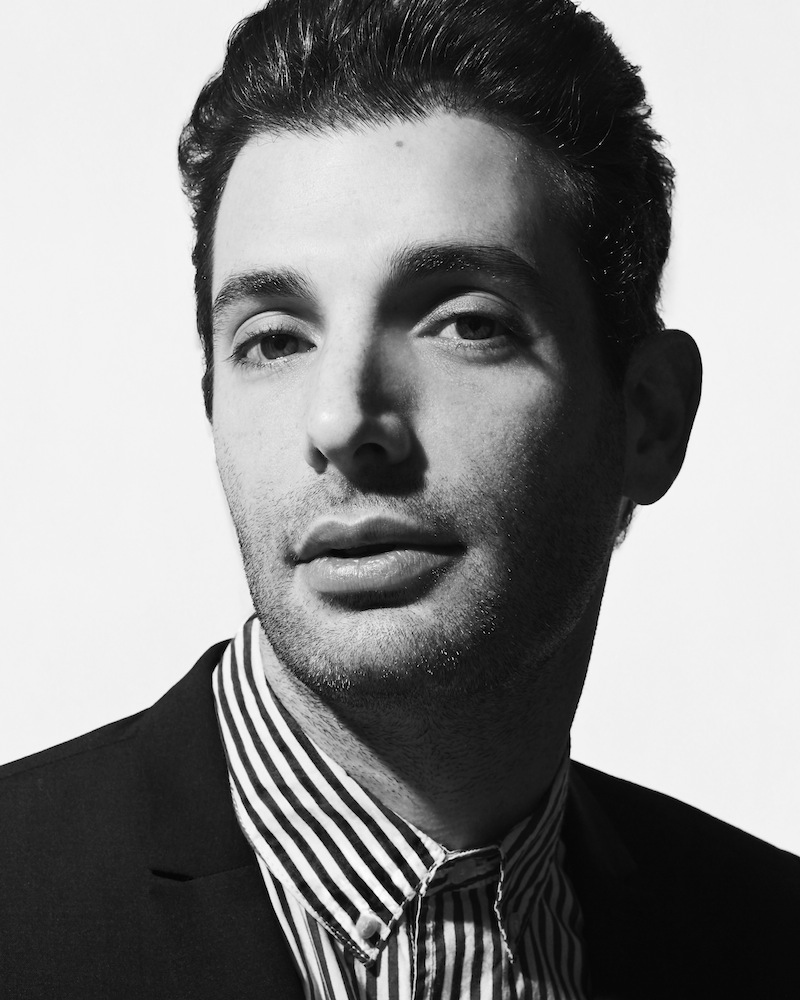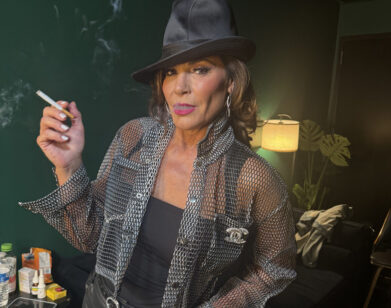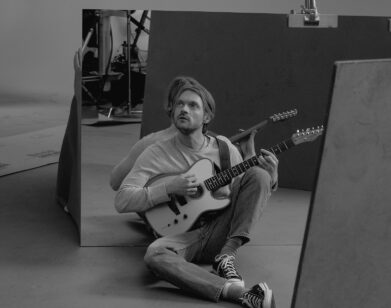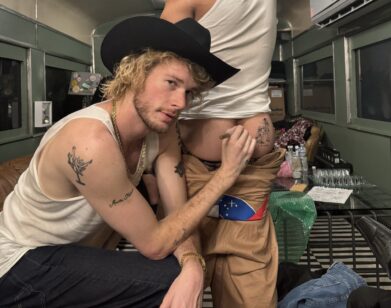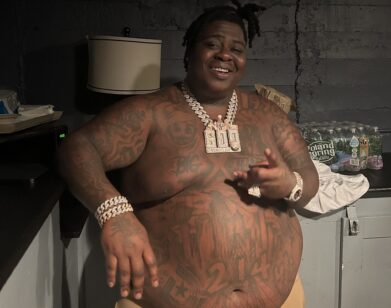Discovery: Sono Oto
MARK HENRY PHILLIPS IN NEW YORK, JANUARY 2017. PHOTOS: VICTORIA STEVENS. STYLING: LILLI MILLHISER. HAIR: NATE ROSENKRANZ FOR HONEY ARTISTS/JOHN MASTERS ORGANICS. MAKEUP: ANDREW COLVIN FOR DR. PERRICONE MD.
Sound design often goes unnoticed. Arguably, that’s its role; it’s in your daily radio fix or podcast routine, key to your favorite films and television programs, artfully guiding the narrative forward. Its authors are technically adept, their ears attuned to minutia and the discrete elements of a recording. Their more nebulous (but undeniable) contribution is in their artistry: an ability to know what’s needed where, when to add and when to pull back, how to complement without overshadowing.
In the case of Mark Henry Phillips, this ability extends beyond his day job. Yes, he’s the sound designer behind the first season of Serial, the much-streamed investigative podcast; as well as the producer, editor, sound designer, and composer of Homecoming, a scripted podcast featuring Catherine Keener, Oscar Isaac, David Schwimmer, and Amy Sedaris; and most recently scored two short films that premiered at Sundance Film Festival (Bayard and Me, Hold On). But he’s also a musician in is own right—though he didn’t always feel comfortable defending that title.
“I stopped telling people I even played music because it was like, ‘Well, you haven’t released anything in a decade. You haven’t really done any music, so are you a musician?'” says Phillips over the phone. “Over the past six to ten years, I would get really excited about stuff and share it with someone. And no matter what their reaction was, it would demotivate me…at a certain point, I just had to put my head down and say, ‘I’m going to finish this.'”
The outcome, his debut album Inheritance, will be self-released on March 24 under the moniker Sono Oto. Today we premiere “How Do You Feel,” its second single, which is at first measured and lyrical and takes a satisfying, punchy turn.
NAME: Mark Henry Phillips a.k.a. Sono Oto.
AGE: 35.
BORN: Columbus, Ohio.
BASED: Brooklyn, New York.
A DECLARATIVE CHANGE: I was working as a producer and reporter in public radio, and I did that for a good seven years. I wanted to be a musician and wanted that to be my job, but thought, “I don’t know if I can make a living doing this,” so that became my day job. But then after seven years I guess I wanted to do something more fulfilling, more creative. I was tired of the deadlines weighing on me, of always having to be doing a new story. All of my friends were working in film and they all seemed to need a sound designer and someone who did sound and music. It was this crew of really talented people, so I just quit my job and declared, “I’m a sound designer now,” and had no idea what I was doing for the first couple of jobs that I did. [laughs] But coming from that background—I started recording music when I was in the fifth grade, and also working with sound in radio, editing dialogue all day every day for seven years, you develop an ear for how things should sound and what’s effective sound, and what are the subconscious ways of influencing people with sounds.
MAKING MUSIC: I started when I was still working in public radio, but there was really no time to work on stuff. I guess it was around the time that my dad got really sick, and I was going back and forth between Columbus, Ohio and here, almost every weekend for a while. And then he eventually died, and it [felt] like, “Music is important to me. It’s something I really need to be doing more.” So that’s when I really started trying to finish these songs that had been floating around for years. But then I also quit my job and decided I was a sound designer… It was a rambling process, so it’s hard to describe how I procrastinated for so long. I started this new career and I was freelancing, and I felt like if I sat at home and music all day, I would be wasting [time], like, “Well, you’re supposed to be starting this new career.” It took years for me to feel like my sound design and my scoring was a viable career. Once that happened, I think it really freed me up to work on the music with my time between projects, because making music had sort of become my job. I was scoring more and more stuff, so I kind of spent all day every day making music, and then when I didn’t have a job, it felt way more natural to keep working on the tunes that had been sitting there for years at that point.
INHERITANCE: It has a double meaning. First of all, the name came [when the album] was done, mixed, and ready to go, and I didn’t have a name for the album. I took a step back and looked at what a lot of the songs meant to me. My dad and I weren’t very close, I think we got closer after he got sick, but after he died I was left with this feeling that there was a lot of stuff that he just didn’t have time to figure out. I found this box of letters, of letters he had written his dad, and it was all the same issues that I had with my dad, and I thought, “Holy shit. If you can’t figure out your own issues with your dad, you pass them on to your son, and now I have them.” I don’t have kids, but if I ever do, I don’t want to keep this cycle going. There’s this rawness and melancholy to a lot of the songs, and I feel like it’s trying to work through that issue, of how do I let go of this emotional baggage that my dad inherited from his dad, and I inherited from him. As he was dying, I think part of it was turning some of the anger or resentment I felt into sympathy, and really understanding that he was trying the best he could. It sounds a little bit weird that, “Oh, my inheritance is I get to make an album,” but part of it is that him dying gave me this freedom of, “Life is short. I just want to try and do what’s fun and what I feel is fulfilling.” But the real meaning to me that resonates is harder to describe; it’s more about what you inherit from your parents, emotionally and psychologically.
WRITING: Lyrics are kind of the roadblock for me, because I write a lot of lyrics as I’m writing the tune more based on how the words sound. I don’t sit down and say, “I want to write a song about this.” So then these lyrics, sometimes they’re awful, sometimes I’m like, “Oh, that’s a cool one,” but they’re more subconscious. … I feel like, “Oh, this is cheesy,” if I write something consciously, then it feels too on the nose. At least in this case, it took years; a line would come up, and then three months later another line, and six months later another line, so the lyrics slowly filled their way in the more and more I played the songs and tried to let the lyrics come more subconsciously, rather than pen to paper style.
THE START: I became obsessed with the Beatles, and so I made this mixtape, and I became obsessed with it. I convinced my grandma to buy me a guitar and started learning the songs on guitar. But I quickly realized, it’s probably around sixth grade, that it wasn’t just the songs: It was the production that I loved. You know how someone would want to play along with a folk song on guitar? I wanted to play along with the production, so I convinced my grandma to get me a little cassette four-track, and then taught myself and figured out all of these tricks that are totally standard. It’s like someone had taught me all of this stuff that people figured out in the eighties or the seventies, but I was figuring it out on my own in middle school. I figured out all of these cool tricks and, if you want to go Malcolm Gladwell 10,000 hours style, by the end of high school I had spent so much time messing around with recording that it really influenced the way I hear not just music, but also movies, and even just natural environments. I can sort of break things down into their component parts, and I think that’s a big part of being a sound designer and also a music producer.
Growing up I probably played more keyboards than guitar, mostly because there’s more of a demand for a mediocre keyboard player than there is for a mediocre guitarist. [laughs] I always sang somewhat reluctantly, and I think because I don’t love singing, I try and treat it as another thing that gets produced, just like a guitar: If you just plugged it directly into a board it would sound really dry and weird, but you put it through pedals and amps and reverb and compression. That’s how I think about vocals and singing: It’s raw material to get produced.
PARING DOWN PRODUCTION: I can spend two days on a two-minute section of a movie, just trying to clean up the dialogue and make the sound effects work. When you have to have that level of focus and attention to sound all day for your work, it’s hard for me to turn that off [with my music] and think, “Oh, that sloppy part is good enough,” and let it slide by. But then I’m also aware that you can overproduce stuff, and take spontaneity out, and take the happy accidents out. It’s about striking a balance and that definitely was part of what took so long for me: I would overproduce something and make the rhythm just perfect, but then I’d come back to it a day later, after spending five days making the rhythm perfect, and say, “You know what—it’s lost its life.” And then I would return back to where I was five days before. It’s about knowing what to direct all of that attention to and knowing what to leave totally untouched.
SERIAL: It felt like radio stories. I mixed each episode, but I didn’t feel like there was a ton of sound design design. A lot of it was restoration because there were all of these tapes from the early 2000s of interview recordings. I would spend hours trying to make those slightly more audible. And then the scoring was almost this afterthought; I normally only had two days to turn around each episode, and I would spend a lot of it mixing and trying to clean everything up. We had a few songs that we could use, but often it felt like using pre-recorded tracks was infusing the story with way too much of a “we’re guiding the listener into what to think and what to feel.” So the struggle was that it needed a little music to move the story along, but we don’t want to sway people and say, “Now you should be scared,” or, “Now you should think this guy is guilty.” It was about coming up with neutral music that didn’t affect people too much, but what is neutral music? That was always the note, and it was the right note. I worked with the executive producer Julie Snyder really closely; her note with the music was always, “Could it be something more neutral?” And it was like, “Yes, but what does neutral sound like?” [laughs] Sometimes the music did feel too ominous, so simplicity was the name of the game there. It’s kind of ironic because it was such a huge smash hit, but the music for me was very simple and I didn’t spend a lot of time on it. It was just, “Here’s a chord progression,” or, “Here’s one note on the piano.” If I knew it was going to be such a huge hit, I would’ve wanted the music to be more complicated or more demonstrative of all I could do, but ultimately scoring isn’t about making cool music or good music. It’s about making music that people don’t even notice and that helps tell the story, and helps people stay in the story, rather than take a step back and think, “Wow, that’s a cool song.” If they’re doing that then you’ve failed.
INHERITANCE IS OUT MARCH 24, 2017. FOR MORE ON MARK HENRY PHILLIPS, VISIT HIS WEBSITE AND FOR MORE ON HIS MUSIC AS SONO OTO, VISIT THIS WEBSITE.

